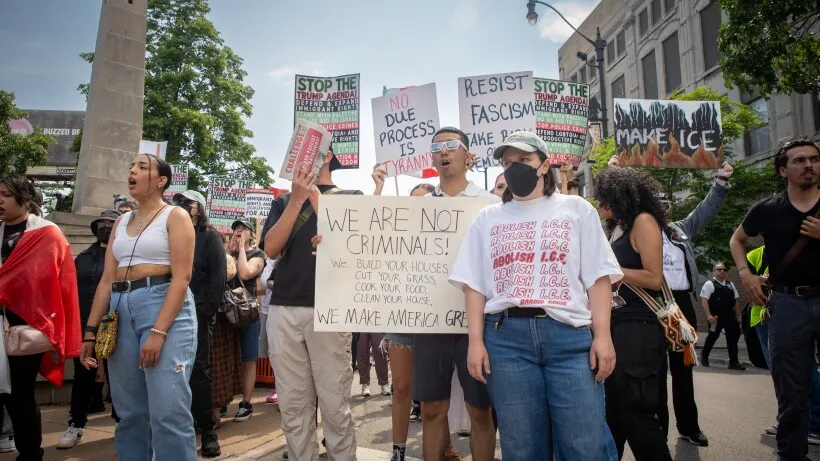Chicago’s Response to ICE Raids
In recent weeks, protests have erupted in Chicago in response to planned Immigration and Customs Enforcement (ICE) raids. With the backdrop of President Donald Trump’s aggressive immigration policies, local communities have mobilized, rallying against what they see as an unjust and oppressive enforcement of immigration laws.
The Planned Protests
As news of ICE raids surfaced, community organizations, activists, and concerned citizens began organizing demonstrations across the city. These events aim to not only stand in solidarity with those at risk of deportation but also to advocate for broader immigration reform.
Protests have been strategically planned to coincide with dates that are rumored for these raids, with gatherings scheduled in various neighborhoods known for their large immigrant populations, including Pilsen, Little Village, and Albany Park. Activists are utilizing social media platforms, community bulletin boards, and church gatherings to ensure that the message reaches as many people as possible.
Objectives of the Protests
At the heart of these protests is a demand for justice and humanity towards immigrant communities. Protesters carry signs reading, “No Human Being is Illegal” and “Families Belong Together,” emphasizing the moral imperative to protect the rights and dignity of individuals regardless of their immigration status.
Additionally, the protests highlight the need for transparency and accountability from local and federal law enforcement agencies in their treatment of immigrants. Organizers and participants are calling for an end to collaboration between local police departments and ICE, a practice that many believe exacerbates fear and distrust within communities.
Allegations Against Chicago Police
As these protests gained momentum, reports emerged suggesting that the Chicago Police Department (CPD) may have assisted ICE during recent mass arrests. This raised significant concerns among community leaders and activists about the police’s role in enforcing federal immigration policies.
Many community members have reported instances where local law enforcement allegedly provided ICE with information regarding immigrants’ locations or even aided in detaining undocumented individuals during routine police interventions. These claims have sparked outrage and raised critical questions about the collaboration between CPD and ICE.
Calls for Investigation
In response to these allegations, several city leaders and immigrant advocacy organizations are calling for a thorough investigation into the practices of the CPD and their relationship with ICE. The citizens are demanding that any collaboration that endangers the safety and well-being of immigrant communities be halted immediately.
Community forums have also been organized, where residents share their experiences and discuss strategies to safeguard their rights. During these discussions, many participants expressed feeling increasingly vulnerable as a result of their perceived association with law enforcement.
Community Reaction and Support
The city’s response to the planned protests has varied. While some community members and leaders have voiced strong support for the demonstrations, others have expressed concerns about potential violence and unrest, echoing sentiments heard in other cities experiencing similar protests.
Local businesses in affected areas are also displaying support for the protests, with some owners closing their storefronts during demonstration hours to allow their employees to participate. This solidarity showcases a collective effort to unify communities against perceived injustices, foster dialogue, and leverage local economic power for social change.
The Role of Faith-Based Organizations
Many faith-based organizations have emerged as pivotal allies in the fight against ICE raids. Churches, mosques, and synagogues across Chicago have opened their doors as sanctuaries for those seeking protection from deportation. These religious institutions are actively providing legal resources, support networks, and safe spaces during ongoing protests.
Additionally, leaders from these communities are speaking out against ICE and advocating for humane immigration policies. They have established partnerships with civil rights organizations to ensure that the fight for immigrant rights remains at the forefront of political discourse.
The Larger Implications
The protests in Chicago reflect broader national movements advocating for immigrant rights and social justice. As similar demonstrations take place in cities across the United States, Chicago stands as a beacon of resilience and activism, with its diverse population uniting for a common cause.
The increasing visibility of these protests could have meaningful implications for local and national elections, as candidates grapple with the evolving dynamics of immigration policy and community relations. Public sentiment regarding how immigrants are treated will likely play a larger role in the upcoming political landscape, as constituents push for change.
Conclusion
As Chicago prepares for the planned protests against ICE raids, it is evident that the community is standing firm against injustice and seeking to protect its most vulnerable members. With growing allegations against local law enforcement and calls for a more equitable immigration policy, the city is at a crossroads. The outcome of these demonstrations may not only affect local immigrant communities but also shape the national dialogue surrounding immigration enforcement and civil rights.
Moving forward, the resilience displayed by protestors and their allies will be critical in driving meaningful conversations and fostering change in a landscape that has often been hostile to immigrants. Community unity, advocacy, and sustained pressure on city leaders could pave the way for greater protections and rights for all immigrants in Chicago and beyond.







